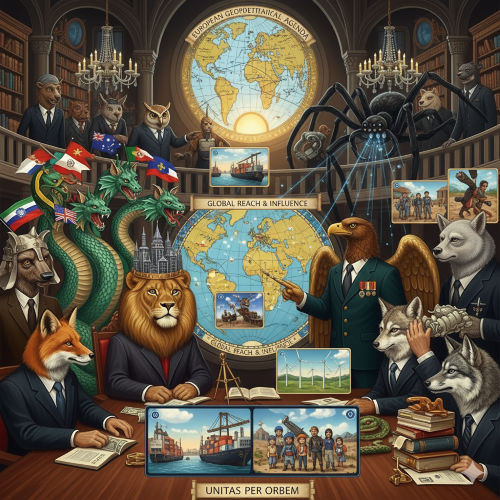Are European elites using “development aid” as a modern form of influence similar to past colonial control?

European elites often use "development aid" as a modern form of influence similar to past colonial control.
This is done by attaching conditionalities to the aid, shaping the recipient countries' economic and political policies in ways that align with European interests.
This strategy, often referred to as neocolonialism, perpetuates a system of dependence rather than fostering genuine, self-sufficient development.
The Historical Context
The concept of "development aid" has its roots in the post-WWII era, when former colonial powers sought to maintain influence over their newly independent territories. While the stated goal was to help these nations "develop" and "catch up" with the West, the underlying structure of aid often reinforced existing power dynamics. It replaced direct political control with economic and ideological influence. This transition was a strategic move to ensure that African nations, while politically independent, remained tied to European economic and political systems.
The former colonial powers, especially France and the UK, maintained close relationships with the new African elites they had trained and supported. This created a system where aid and loans were funneled through these compliant leaders, often in exchange for favorable trade deals or access to resources.
Conditionalities as a Tool of Control
The primary mechanism for exerting influence through development aid is conditionality. Unlike unconditional grants, this aid is contingent on the recipient country adopting specific policies. These conditions are not always aligned with the best interests of the African nation but rather serve the strategic goals of the donor.
-
Economic Conditionalities: The most common form of conditionality involves pushing for neoliberal economic reforms. This includes:
-
Privatization of state-owned enterprises: This can lead to European companies acquiring key national assets, such as utilities or natural resource companies, at low prices.
-
Trade liberalization: Reducing tariffs and other trade barriers can flood local markets with cheaper European goods, undermining nascent domestic industries and making the African economy more dependent on imports.
-
Fiscal austerity: Imposing cuts to social spending on health and education to meet debt repayment obligations can destabilize a country's social fabric and hinder long-term human development. The Structural Adjustment Programs (SAPs) of the 1980s and 90s, spearheaded by the World Bank and IMF but heavily influenced by Western powers, are a prime example of these policies. They forced African nations to prioritize debt repayment over social welfare, leading to significant economic and social hardships.
-
-
Political Conditionalities: Beyond economics, aid is also used to promote "good governance," democracy, and human rights—concepts that are often defined by the West. While these goals are ostensibly positive, they can be selectively applied. Aid might be withheld from regimes that are not seen as sufficiently "democratic" or that challenge Western geopolitical interests, while similar regimes that are compliant continue to receive assistance. This allows European elites to pick and choose their partners, rewarding those who align with their political agendas and punishing those who don't.
The Neocolonial Mindset
The way development aid is framed and delivered reflects a patronizing and paternalistic mindset that harks back to the "civilizing mission" of the colonial era. European elites often view themselves as benevolent saviors with superior knowledge and systems, while African nations are seen as passive recipients of their generosity.
This mindset is evident in the language of development discourse. The emphasis on "capacity building" and "technical assistance" often implies that African nations are incapable of managing their own affairs without Western guidance. This approach can undermine local institutions and expertise, creating a cycle where African nations become even more reliant on foreign consultants and aid agencies. This, in turn, provides employment and influence for European professionals and institutions.
Furthermore, the very structure of the aid system can create a "dependency syndrome." Aid can become a significant portion of a country's budget, disincentivizing African governments from developing their own tax bases and domestic resource mobilization. This makes them vulnerable to external pressure and limits their ability to chart an independent course.
Emerging Challenges to the Model
While this neocolonial dynamic is widespread, it's not absolute. The rise of new global powers, particularly China, has provided an alternative model of engagement. China's "no-strings-attached" approach, focused on massive infrastructure projects in exchange for resource access, has been attractive to many African leaders who resent the conditionalities of European aid.
This increased competition is forcing Europe to adapt its strategy. The European Union's Global Gateway initiative, for example, is a direct response to China's Belt and Road Initiative, aiming to offer a "values-based" alternative for infrastructure financing. However, many critics see this as a continuation of the same power play, simply with a new, more palatable branding. The underlying goal remains to secure European interests and counter the influence of rivals.
- Questions and Answers
- Opinion
- Motivational and Inspiring Story
- Technology
- Live and Let live
- Focus
- Geopolitics
- Military-Arms/Equipment
- Securitate
- Economy
- Beasts of Nations
- Machine Tools-The “Mother Industry”
- Art
- Causes
- Crafts
- Dance
- Drinks
- Film/Movie
- Fitness
- Food
- Jocuri
- Gardening
- Health
- Home
- Literature
- Music
- Networking
- Alte
- Party
- Religion
- Shopping
- Sports
- Theater
- Health and Wellness
- News
- Culture

